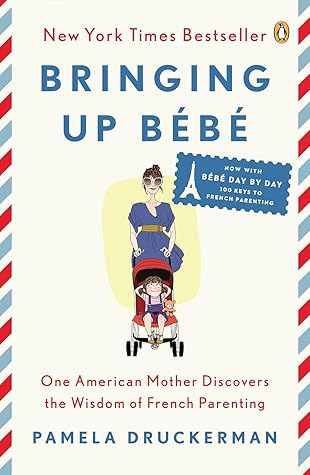More on this book
Community
Kindle Notes & Highlights
Read between
June 24 - June 27, 2022
Yet the French have managed to be involved without becoming obsessive. They assume that even good parents aren’t at the constant service of their children, and that there’s no need to feel guilty about this.
Tori Lepore liked this
American women typically demonstrate our commitment by worrying and by showing how much we’re willing to sacrifice, even while pregnant, whereas Frenchwomen signal their commitment by projecting calm and flaunting the fact that they haven’t renounced pleasure.
“The parents who were a little less responsive to late-night fussing always had kids who were good sleepers, while the jumpy folks had kids who would wake up repeatedly at night until it became unbearable,” he writes.
Another reason for pausing is that babies wake up between their sleep cycles, which last about two hours. It’s normal for them to cry a bit when they’re first learning to connect these cycles. If a parent automatically interprets this cry as a demand for food or a sign of distress and rushes in to soothe the baby, the baby will have a hard time learning to connect the cycles on his own. That is, he’ll need an adult to come in and soothe him back to sleep at the end of each cycle.
She sometimes waited five or ten minutes before picking them up. She wanted to see whether they needed to fall back to sleep between sleep cycles or whether something else was bothering them: hunger, a dirty diaper, or just anxiety.
One rule on the handout was that parents should not hold, rock, or nurse a baby to sleep in the evenings, in order to help him learn the difference between day and night. Another instruction for week-old babies was that if they cried between midnight and five A.M., parents should reswaddle, pat, rediaper, or walk the baby around, but that the mother should offer the breast only if the baby continued crying after that.
“The results of this study show that breast-feeding need not be associated with night waking.”
For Dolto, “the child’s best interest is not always what will make him or her happy, but rational understanding,” wrote MIT sociologist Sherry Turkle in an introduction to Dolto’s When Parents Separate. Turkle writes that what a child most needs, according to Dolto, is “a structured inner life able to support autonomy and further growth.”
What really fortifies Frenchwomen against guilt is their conviction that it’s unhealthy for mothers and children to spend all their time together. They believe there’s a risk of smothering kids with attention and anxiety, or of developing the dreaded relation fusionnelle, where a mother’s and a child’s needs are too intertwined. Children—even babies and toddlers—get to cultivate their inner lives without a mother’s constant interference.
“The couple is the most important. It’s the only thing that you chose in your life. Your children, you didn’t choose. You chose your husband. So, you’re going to make your life with him. So you have an interest in it going well. Especially when the children leave, you want to get along with him.
There are structural reasons why Frenchwomen seem calmer than American women. They take about twenty-one more vacation days each year.10 France has less feminist rhetoric, but it has many more institutions that enable women to work. There’s the national paid maternity leave (the United States has none), the subsidized nannies and crèches, the free universal preschool from age three, and myriad tax credits and payments for having kids. All this doesn’t ensure that there’s equality between men and women. But it does ensure that Frenchwomen can have both a career and kids.
It turns out that French parents don’t start their babies off on bland, colorless grains. From the first bite, they serve babies flavor-packed vegetables.
Once a child can speak fluently, French parents and teachers don’t automatically coo at everything he says. When he’s wildly off topic, they say so, and steer him back. At the dinner table, they pay more attention when he says clever things and expresses himself well. This is meant to be constructive. They aim to turn the child into a good conversationalist, not a bore who blathers on. (He might get away with that at his grandmother’s, but it will be less charming later on dates.)


